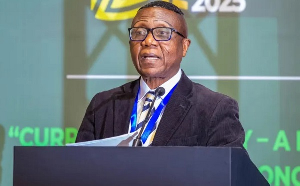Pupils of Anyako Evangelical Presbyterian (E.P) Basic School on Saturday appealed to the Ghana Education Service (GES) to as a matter of urgency address the shortage of teachers at the School.
They said there was an acute shortage of teachers in the area and in their School in particular, and was the main cause of high indiscipline and poor academic performance of pupils there.
Miss Woelinam Akaba, Girls’ Prefect of the School, made the appeal at the School’s Open Day and commissioning of an Information Communication Technology (ICT) centre for the School.
The ICT centre was at the instance of the Anaglate family in memory of the late Christopher K. Anaglate.
The GH¢17,300 facility, is to offer practical ICT lessons to the pupils.
Miss Akaba said, often pupils at the School learn on their own because there are no teachers to teach a particular lesson or even handle the class.
She said this had affected the performance of the pupils and appealed to the GES to post teachers to the School to help save the situation.
Reverend Ferguson K. Acquah, Headmaster of the School, in a speech read on his behalf noted that, for the past two years, only two female teachers handle the primary school and “currently only one is at post as the other was on maternity leave”.
He said the Junior High School (JHS) also has only two government sponsored teachers handling a total of 139 students.
Rev. Acquah said, but for the recruitment of five Community Trained Assistants and two National Service Personnel whose services would end in July, the JHS could have been in serious problem.
Mr. Edmund Doe Gbetodeme, Keta Municipal Director of Education, described the situation as worrying and assured that something would be done soon.
Mr. Ebenezer Dzikunu, Volta Regional Manager of E.P Schools, said though the situation at Anyako was disturbing, teacher shortages at schools was not intentional.
He advised pupils to be disciplined and respectful and cultivate the habit of learning on their own when teachers were not readily available.**
Regional News of Sunday, 13 May 2012
Source: GNA












